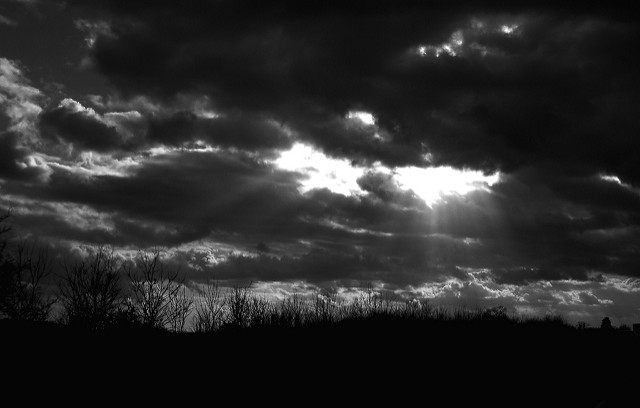The mountains ringed a long, wooded enclosure that contained an earthen path. A person emerged occasionally from the woods by the enclosure, started on the path, and walked it the entire day. At night, he sat by the path side and went to sleep. He did the same the following days and nights. All the people on the path did. They lived by eating wild plants and drinking from streams by the path’s edge. This pleased the people and none of them ever quit the path.
Then a young man among them took a dislike to it. “I walk around and around,” he thought, “and it’s driving me crazy.” He went into the woods and up the mountainside. The mountains proved steeper than he supposed and he marched up them, body and head forcefully thrust forward. He came to a broad, open area floored in dead autumn leaves. On an urge, he ran the leaf-strewn ground following the mountain slope. He ended back at the earthen path. He was angry and felt he had been tricked. Promptly, he turned and reentered the woods. He hiked far and went a good distance up a pine-clad mountain. He walked the remainder of that day and the next several, feeling compelled to go and yet knowing he chose to go. While the mountain forest was dark and strange, he marched determined to walk it. After a great distance, the young man descended, not knowing where he was but feeling it right after the trek that had exhausted him. When he reached the mountain bottom, he discovered he was again at the earth path within the enclosure. The walkers on the path learned and said he should accept he always would circle on the path as they did.
The young man refused to listen. He considered his problem was not his idea to leave the path, but how he had walked the mountainside: he had let his steps go too often where chance led, not where he had meant. He decided that he would stick relentlessly to a route on his next journey. He went up the mountainside. He took the first hundred steps of the journey as he planned. Then he meandered a bit, curious to see some tree at the edge of his line of sight. He brought his steps back to his decided line. He went on slowly as the steep slope of the mountain played him havoc, a wayward tumble imminent at each footfall. But he made it up the mountain as he had meant.
After the young man rested, he journeyed around the mountains and felt a new kind of control as he followed different routes of his own choosing. He took an arched, then an elliptical path, even followed a zigzag, a weaving course that underlined for him his new freedom. He returned to the earth path at will and told the people there of his journeys. They had never known anyone to leave the path as he did, and several asked if he might lead them into the mountains, too.
“But why don’t you go into the mountains yourselves?” he said.
“We don’t think we would make it very far.”
“Have you at least tried?”
“We might manage better if you helped us.”
The young man feared the people would stay on the path unaided, so agreed to lead them. As the people followed him up the mountain, one man said they were ascending higher than he had liked. He excused himself and took his way elsewhere. Soon others followed suit, going their own paths, much to the young man’s relief. He realized the people had taken liberties to go where they would without him. As the people’s routes widened and ascended the mountains, the young man encountered them in his travels. These wayfarers became his friends, which he had not expected when he first led them in their fear. He looked forward increasingly to their meetings. His mountain journeys had started to bore him. He had never expected he would be bored after leaving the earthen path, he told himself.
One day, the young man came to a clearing in the mountain forest where he saw the mountaintops that loomed over the enclosure. He felt it strange that in all his journeys he had never crossed them. He considered that beyond the mountains there might be other forests and open spaces, other pools larger and wider than by the earthen path, other people he never knew existed. “What might I say or do when I meet them?” he thought. Driven to know, he decided to cross the mountains any way he could.
The mountains above the path were very high and rugged, and the young man hiked a long time before finding one he was sure he could cross. He had come in light clothes for he had not considered the mountains at their heights would be very cold and their air thin unlike the enclosure or even the forest. He came short of breath as he hiked through snow near the mountaintops and found it nearly impossible to walk. He almost imagined he would not make it through. However, he sought for a path for he believed he must find one.
Norbert Kovacs is a short story and flash fiction writer based in Hartford, CT. He has been published in Squawk Back.
